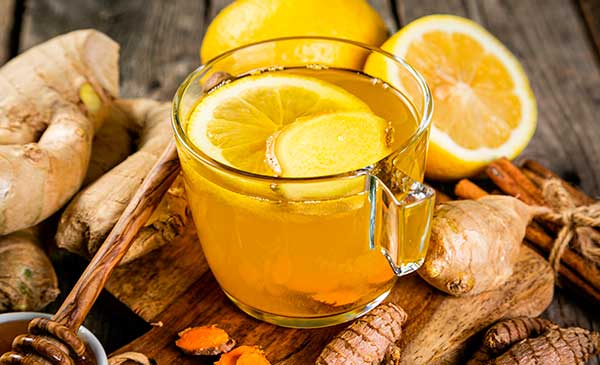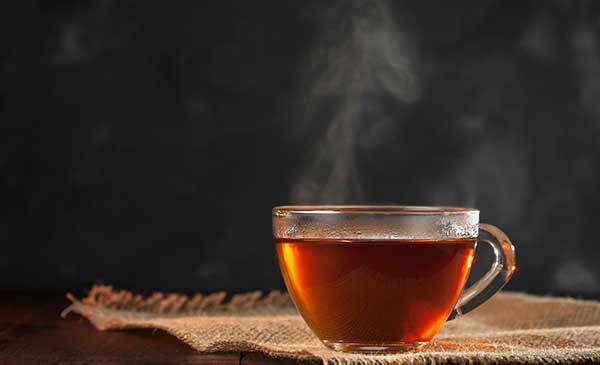8 Health Benefits of Ginger Tea

Why Is Ginger So Good for You?
Who knew this funny little root could be so good for you? I first fell in love with ginger while enjoying some sushi with pickled ginger on the side. Fresh ginger tea has been a natural remedy for many symptoms (like nausea) around the world for thousands of years. Ancient civilizations relied on the effects of ginger root well before any anti-nausea and anti-inflammatory medications even existed.
Based on science and tradition, ginger is also used to treat sore throats. The anti-inflammatory properties of ginger provide pain relief. Ginger also helps to boost immunity to fight infections and avoid the sore throat in the first place.
There are so many simple ways to incorporate ginger into your diet and benefit from ginger's medicinal properties.
After years of being medically reviewed, we learn more and more about the powerful health benefits of ginger. Compounds found in ginger (gingerol, shogaol, paradol, and zingerone) help fight free radicals, reduce inflammation, and the risk of chronic disease. The super compound gingerol is responsible for most of the health benefits.
Eight Ginger Tea Benefits
- Ease Stomach Aches with Improved Digestion
- Boost Immunity
- Protect Brain Health
- Provide Pain Relief
- Help with Weight Loss
- Control Blood Sugar
- Lower Blood Pressure
- Lower Cholesterol
Improve Digestion and Ease Stomach Aches
Studies have shown that ginger may play a part in better digestion and preventing stomach ulcers.
A Taiwan study showed consumption of ginger capsules helped prevent indigestion by doubling the speed the stomach was able to empty.
Ginger tea is a simple home remedy if you are suffering from an upset stomach, nausea, motion sickness, or morning sickness. Ginger helps stomach pain by breaking up and ridding your intestines of built-up gas.
A study out of the University of Rochester Medical Center found that ginger provided chemotherapy patients with some relief from nausea. Another study in Thailand found that ginger eased nausea and vomiting during pregnancy. Add lemon or mint to your tea to boost this effect.

Boost Immunity
Feel like you're coming down with the common cold? Steep a cup of ginger tea to give your body an immunity boost. The chemical compounds in fresh ginger may help your body ward off germs by halting the growth of bacteria like E.coli. These compounds may also help keep viruses at bay.
Protect Brain Health
The anti-inflammatory properties of ginger may also help support the health of your brain. Some experimental studies suggest the compound shogaol may help enhance memory. It also may provide antioxidant defense against neurological diseases like dementia and Alzheimer's. One study showed middle-aged women who took ginger extract for two months experienced an improvement in attention and cognitive function.
Provide Pain Relief
Staying as active as possible as we age is important, but sometimes that means experiencing some joint or muscle pain. Studies have shown that because of its anti-inflammatory properties, ginger is an effective pain reliever for injuries related to exercise. It also helps to reduce muscle and joint pain.
People who suffer from chronic pain have found some relief by adding a cup of ginger tea into their daily regimen. Researchers have also found that highly concentrated doses of ginger extract have been effective in treating people with osteoarthritis. Ginger has also been shown to help decrease the severity of menstrual cramps.
Help with Weight Loss
If you're struggling to lose a few pounds, try sipping on a cup of ginger tea in the morning. This will kick start the fat-burning process which may help you lose those extra pounds. Ginger can also help you feel fuller longer.
The compound gingerol encourages your body to digest food faster. It stimulates the body to move the digested food through your system. Try adding a few ginger slices to your water for hydration during the day.

Control Blood Sugar
The compound gingerol also helps stabilize blood sugar levels. This can be a key to losing weight as well as help regulate insulin response in people with diabetes.
Lower Blood Pressure
If you suffer from high blood pressure, ginger may help keep it under control. It is still being studied in humans, however, studies show that ginger helps improve blood circulation in animals. By relaxing the muscles surrounding blood vessels, blood pressure was reduced in the studies.
Lower Cholesterol
High cholesterol can clog your blood vessels and increase the risk of heart disease. Studies have found that ginger may help lower cholesterol levels and help protect your heart health. A daily dose of ginger may help you battle “bad” or LDL cholesterol levels. During a three-month study, people who consumed 5 grams of ginger daily experienced a reduction in LDL cholesterol.

If you've already a ginger tea lover, try adding some other ingredients to help detoxification and support your immune system:
- Turmeric — Known as a warming spice, turmeric helps balance your metabolism. Curcumin, the active compound in turmeric, provides anti-inflammatory and antioxidant effects and may help with digestion.
- Lemon juice — Lemon’s natural cleansing abilities rejuvenate the liver. Add a squeeze of lime in your water or tea in the morning to naturally flush out toxins. The citrus acidity wakes up nerves in the digestive system and liver and encourages healthy digestion, and good bowel movements.
- Raw honey — Honey is a natural sweetener that may help boost immunity with enzymes and antioxidants.
- Cayenne pepper — Cayenne pepper contains capsaicin, a chemical that helps boost circulation. A 2014 study showed that people who consumed cayenne pepper with every meal felt full sooner. It also helped reduce cravings in between meals by suppressing their appetite. And we all know, reduced caloric intake results in increased weight loss.
Does Ginger Have Any Nutritional Value?
Here is the nutritional breakdown of ginger, based on one tablespoon serving:
- Calories: 4.8
- Carbohydrates: 1.07 grams
- Dietary fiber: .12 g
- Protein: .11 g
- Fat: .05 g
- Sugar: .1 g
Trace amounts of vitamins and minerals can also be found in fresh ginger:
- Vitamin B3 and B6
- Iron
- Potassium
- Vitamin C
- Magnesium
- Phosphorus
- Zinc
- Folate
- Riboflavin
- Niacin
How to Cook with Ginger Root
Discover the fresh, peppery flavor of ginger, and realize how many simple ways you can incorporate it into your diet. Grate some ginger into your stir-fry dish, or add ginger powder to soup for a bit of flavor. Ginger can also be eaten fresh, ground into a smoothie, or your favorite infusion.
Try sprinkling Crystallized Ginger over salads for a spicy kick or add some finely grated to your ginger salad dressing. Or add to homemade cranberry sauce with orange zest. Also delicious just as a snack and easy to take along when traveling to help calm your stomach.
Even try soaking in it by adding a few tablespoons of ginger to a relaxing hot water bath with lavender oil. (And why not enjoy a cup of tea while you soak.)
I'm still trying to figure out who decided to call ginger a knob... :)
Risks and Side Effects
Consuming 1-3 cups of ginger tea daily may help maximize the ginger tea benefits. This moderation may also help minimize the risk of adverse side effects.
In rare cases, some people have an allergic reaction to ginger. Immediately discontinue consumption of ginger If you experience any food allergy symptoms, such as hives, itching, or swelling. Talk to your doctor. Ginger tea may also be associated with mild side effects such as heartburn, diarrhea, or stomach pain.
If you experience any of these symptoms, decrease your consumption of ginger. Consult with a health care practitioner for medical advice diagnosis or treatment if you have any concerns.






